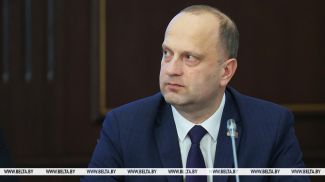MINSK, 31 July (BelTA) – The economies of the Eurasian Economic Union (EAEU) member states are capable of adapting to serious global challenges, Chairman of the Board of the Eurasian Economic Commission Mikhail Myasnikovich said during the international investment teleconference "From Recovery to Sustainable Growth", BelTA has learned.
"Of course, the Eurasian Economic Union economies are facing some difficulties. However, the situation is not critical, especially in the manufacturing industry, and this suggests that the economies of the EAEU states have made much progress and are able to adapt to serious global challenges. For example, agricultural output increased by 1.3%; growth was mostly reported by Belarus, Armenia, Kyrgyzstan. The manufacturing sector of the EAEU member states dropped by merely 2% in January-May (not only because of the pandemic, but also because of fossil fuels), the construction sector shrank by just 0.2%. However, Belarus and Kazakhstan reported a meaningful growth of the construction sector. It is very important that there was no sharp rise in inflation," Mikhail Myasnikovich said.
In January-May 2020, the EAEU foreign trade shrank by more than 16% down to $246.5 billion. "Oil was the main contributor to that. This must be taken into consideration. As far as mutual trade is concerned, it dropped by 15% to $19.6 billion. But now we are already witnessing a rather robust growth. This shows that cooperation between the EAEU states is strong," Mikhail Myasnikovich said.
The EAEU member states discuss ways to maintain food security in the event of serious shocks, like the pandemic and man-made disasters. Technological chains are on the agenda. The EAEU states used to focus on their own economic capacities while implementing import-substitution programs; however now we would like to see the terms of localization extended to cover the entire EAEU. This opens up an opportunity to establish the market of Eurasian products. At the 17 July session of the Eurasian Intergovernmental Council we agreed that the Eurasian Economic Commission will maintain a register of Eurasian products,” Mikhail Myasnikovich noted.
He emphasized that the world used to embrace globalization, but these days self-isolation of nations and rejection of global economic integration are becoming increasingly common. “The choice in favor of isolation by some global economic powers necessitates a re-start and decisions made at the level of heads of state and regional associations. Therefore, we at the EAEU are paying more attention not only to the trade in goods and services, but also to investment. It is necessary to launch new highly competitive companies and products in order to meet the domestic demand and be successful internationally,” the chairman of the board said.
In his words, the EAEU is already mulling over an array of investment projects that might play a crucial role in the EAEU integration. “We need to promote Eurasian infrastructure projects, in particular, those in the transportation sector,” Mikhail Myasnikovich added.













